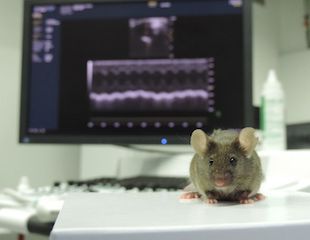Monogenic diseases are individually rare but collectively quite common, posing a huge burden on families and society. Monogenic cardio vascular diseases encompass a wide range of phenotypes that result in coronary artery disease, heart failure, aortic dissection and malignant ventricular arrhythmias.
In this new study, scientists from the German Mouse Clinic at Helmholtz Munich and colleagues from the Queen Mary University of London, investigated genes related to monogenic forms of cardiovascular disease based on the human data from Genomics England and the phenotyping data-sets from mouse lines provided by the International Mouse Phenotyping Consortium (IMPC). The results were published recently in Disease Model Mechanism.
The focus of the analyses was the set of genes involved in monogenic forms of cardiomyopathy, cardiac arrhythmia and congenital heart disease showing clinical manifestations in humans. Based on the analyses, 153 genes were associated with heart diseases in humans, 151 with a one2one mouse ortholog. For 57 mouse models of the 151 genes, viability and heart data captured by electrocardiography, transthoracic echocardiography, morphology and pathology from mouse embryos and young adult mice was available. Interestingly, most candidate genes were linked to lethality. In knockout mice, 43 of 57 of these genes showed non-viable phenotypes, whereas records of prenatal, neonatal or infant death in humans were found for 20 of the 57 genes. Multisystem phenotypes as cardiovascular, metabolic/homeostasis, musculoskeletal, hematopoietic, nervous system and/or growth abnormalities were common in mice and mimicked the clinical manifestations observed in patients. The approach followed in the present study highlights the benefits of the multisystem nature of the mouse phenotyping protocol, allowing to detect abnormalities in several physiological systems important to compare with the clinical manifestations observed in patients, and is thus providing a useful transformative resource to clinicians.
The work underlines the great value of the highly standardised screening pipelines from IMPC that generate a huge volume of data and may provide mouse models that can assist the prioritisation and validation of gene variants. In addition, novel disease-gene discovery can benefit from this genotype-phenotype knowledge base.
Cacheiro P, Spielmann N, Mashhadi HH, Fuchs H, Gailus-Durner V, Smedley D, de Angelis MH. Knockout mice represent an important tool for the multisystemic study of human monogenic heart disease. Dis Model Mech. 2023 Feb 24:dmm.049770. doi: 10.1242/dmm.049770. PMID: 36825469.
IMPC: https://www.mousephenotype.org/
Human Data: https://panelapp.genomicsengland.co.uk/


